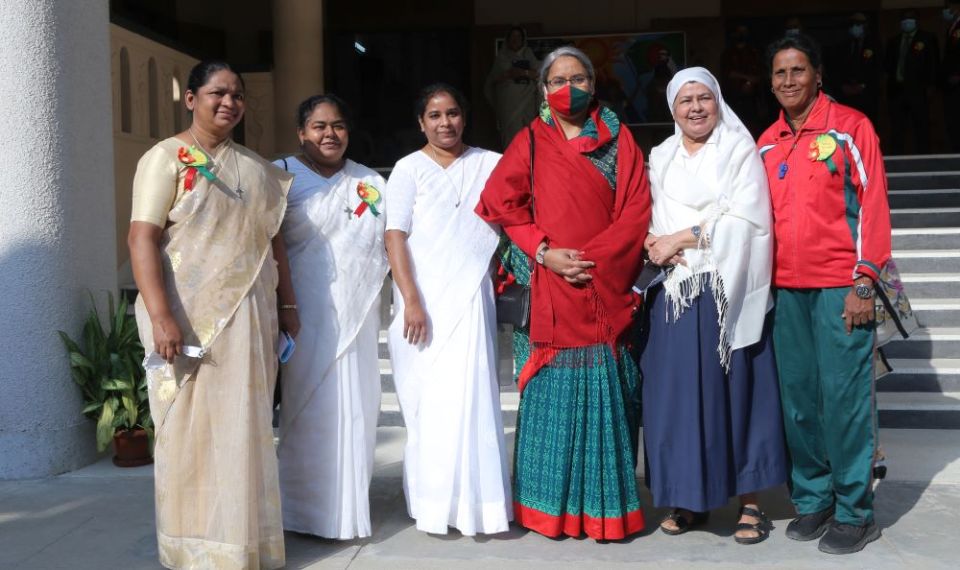9.6.22 Shikha Laetitia Gomes in her office.JPG
Sr. Shikha Laetitia Gomes, a member of the Sisters of the Holy Cross, is the principal of Holy Cross College in Dhaka, Bangladesh, one of the country's top educational institutes for women. Many former students of this college are now doctors, diplomats, writers, politicians, and more: Shirin Sharmin Chaudhury, speaker of Parliament, and Dipu Moni, education minister, are former students, and they still have healthy relationships with the college.
Recently, Gomes told Global Sisters Report that her dream for Holy Cross College is for the students to "continue the spirit: Be the bearers of touch and remove the darkness of the world, opening a new horizon and establishing peace. They will prepare a better Mother Earth for future generations."
She also would like Bangladesh's nuns to have more representation in the country's Catholic Church by having seats on the church's various committees.
GSR: Please tell us about Holy Cross College.
Gomes: Holy Cross College is a sponsored ministry of the Sisters of the Holy Cross and is run by the sisters. Education is one of the prominent ministries of the congregation.
Holy Cross College was established in 1950 in Tejgaon, Dhaka, Bangladesh [when Bangladesh was part of East Pakistan]. Since then, Holy Cross College has offered a quality and holistic education to empower women and form female leadership in the country, helping them grow and develop and focusing on solidarity, peace and harmony. For 72 years, it has been done successfully.
9.6.22 Holy Cross College students.JPG
How does this college transform women's lives?
The founder of the congregation, Blessed Fr. Basil Moreau, said, "Holy Cross education is educating human minds and cultivating hearts." That means transforming life. Transformation is a process. It is like how an ugly caterpillar transforms into a colorful butterfly.
Every year, Holy Cross College admits students from all over Bangladesh. They come here from different backgrounds: different religions and cultures, rich and poor, urban and rural. But at Holy Cross College, within a very short time, a radical change is noticed among them. They feel more comfortable about their identity as women. Gradually, they become confident; self-motivated; ethically, morally and emotionally strong; refined and polished in manners; responsible; serious in their purpose; able to communicate well and develop the social skill of interaction.
They become sensitive to the poor and needy, ready to serve all of humanity and take care of Mother Earth. They learn to appreciate the beauty of life, art and culture, sports and games and the universe. Growing in self-control, they learn to overcome all the challenges of life. They develop their critical, creative, rational and innovative thinking and problem-solving capacity. They prepare themselves for higher studies and future professional lives.
In each family as well as the broader society, they become ambassadors of peace and responsible citizens. They feel comfortable and ready to fly across the world, believing that happiness lies in forgetting self and serving others. The vocation of a true woman is to inspire, vivify and bring peace and to be gentle in manners and strong in deeds, as it was said and expected by our honorable founding principal, Sister Augustine Marie. Growing in the spirit of taking risks, they become creators of new paths. It is so wonderful to see the transformation of young women of Bangladesh.
9.6.22 Shikha Laetitia Gomes and Dipu Moni with teachers.jpg

Some of your teachings, especially quotes posted by former students on social media, inspire thousands of people. How do you feel about it?
Honestly speaking, I do not feel so comfortable being exposed on social media! As a teacher, my first responsibility is to inspire, encourage and motivate my students so, being efficient and responsible, they are ready to lead their own lives skillfully as well as ready to offer themselves for the service of humanity and appreciate life and love, embracing their precious womanhood.
I speak to my girls in a four-walled room. If these teachings and inspirations spread around and other people are also inspired by my quotes, sayings and teachings, I am glad about it. I allow myself to be the work of God. I am the brush in the hand of my artist master. I feel comfortable to be an instrument of the Lord. Basically, the Holy Spirit inspires. It is not me!
How do you become a witness of Christ through this education ministry?
Jesus said, "Go and teach the nation. Be light and be salt." My presence itself is a witness of Christ because I represent Christ. Playing the role of the light and salt and enlightening the minds of many, I think I become the witness of Christ. Reflecting the teachings of Jesus, I am crossing boundaries and reaching out to many.
Minority is serving majority: My daily interactions and encountering many people of other religions is a significant witness. I do believe as a religious woman, living my vowed life and my dedication and commitment to actualize the mission of Jesus is the reflection of a witness of Christ. Swimming against the current, taking a courageous stand for justice, I am a witness of the transforming love of God, bringing new life and hope to the hopeless and powerless, supporting the marginalized, lighting the darkness, making meaning and creating something out of nothing.
Do you think in Bangladesh, nuns require more representation in the Catholic Church?
There are more than 1,100 nuns serving the church of Bangladesh. Without their representation, the church is totally unable to actualize the mission of Jesus. Their representation is a must.
Advertisement
Advertisement
What kind of support do you expect from priests and bishops for nuns?
Bishops and priests must ensure the dignity and importance of the nuns' presence in the church. Their participation, contribution, opinions, wisdom, knowledge, gifts, talents, skills, energy and experiences must be acknowledged and welcomed. Nuns' voices must be heard in the decision-making process. Opportunities need to be provided for higher studies in various fields and professional training. In different committees and commissions, a certain amount of seats must be reserved for them to ensure their presence and participation. They need to be allowed to offer their gifts of charism of their own congregations and the spirit of their founders. A mutual relationship needs to be fostered among the bishops, priests and sisters to be a witness in front of the people of God, wherever they minister.
Do you think nuns require more higher education, theology and skill training?
Yes, it is needed. Nuns must be equally developed spiritually and intellectually to offer quality service.
To give something to someone, I have to have it. We are living in a global village and in a new age. Life is more open than before, and it is rapidly changing. The needs and demands of the people have increased, too.
To be an effective minster in the church, to the people, we sisters need to be well educated and trained according to the needs and signs of the times in various fields. We have to have practical experiences and life skills to understand better the human condition and present realities. To develop creative, critical and rational thinking, to understand our call or vocation deeply and to ensure our commitment and dedication, we need to have a deeper knowledge in multiple subjects as well as in theology. Sisters must be well educated and knowledgeable on the teachings of the church and contemporary theology.
We are living in a competitive world. People are well educated and knowledgeable. Young people are very advanced, skillful, technologically well-equipped and aware of facts. So it is an obligation to have better training and higher studies for the sisters.
Like what you're reading? Sign up for GSR e-newsletters!


